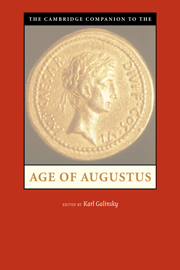Book contents
- Frontmatter
- Introduction
- Part I Political History
- Part II Intellectual and Social Developments
- 3 Mutatas Formas: The Augustan Transformation of Roman Knowledge
- 4 Romans in the Roman World
- 5 Provincial Perspectives
- 6 Women in the Time of Augustus
- Part III The Emperor's Impact
- Part IV Art and the City
- Part V Augustan Literature
- Part VI Epilogue as Prologue
- Select Bibliography and Works Cited
- Index
6 - Women in the Time of Augustus
from Part II - Intellectual and Social Developments
Published online by Cambridge University Press: 28 March 2007
- Frontmatter
- Introduction
- Part I Political History
- Part II Intellectual and Social Developments
- 3 Mutatas Formas: The Augustan Transformation of Roman Knowledge
- 4 Romans in the Roman World
- 5 Provincial Perspectives
- 6 Women in the Time of Augustus
- Part III The Emperor's Impact
- Part IV Art and the City
- Part V Augustan Literature
- Part VI Epilogue as Prologue
- Select Bibliography and Works Cited
- Index
Summary
Themes
In the style of Hercules, o plebs, Caesar, who was just now said to have sought the bay-branch that can be purchased at the price of death, - Caesar is on his way back to his household gods, a victor from the shore of Spain.
Let his wife, rejoicing in the matchless husband who is all to her, come out sacrificing to the just gods, and the sister of our beloved leader, and, adorned with the ribbon of suppliants, mothers of girls (virgines) and of young men lately safe; you, o boys and girls who have now known a husband, refrain from ill-omened words.
(Horace Odes 3.14: my translation is indebted to G. Williams, R. G. M. Nisbet and D. West)Horace in 24 B.C. calls on the Roman plebs (the common people) to welcome Augustus who has crushed its enemies in Spain, thus emulating the monster-slaying half-divine hero Hercules, who later became a god. Augustus had been ill and forced to stay at Tarragona the previous year, when his nephew Marcellus had come home to marry the emperor's daughter, his cousin Julia (born 39), and other young officers had been demobilised. The princeps' wife, Livia, and sister, Octavia (who, in accordance with republican convention in public speeches, are not named) will go out in procession to meet him.
- Type
- Chapter
- Information
- The Cambridge Companion to the Age of Augustus , pp. 130 - 148Publisher: Cambridge University PressPrint publication year: 2005
- 4
- Cited by

